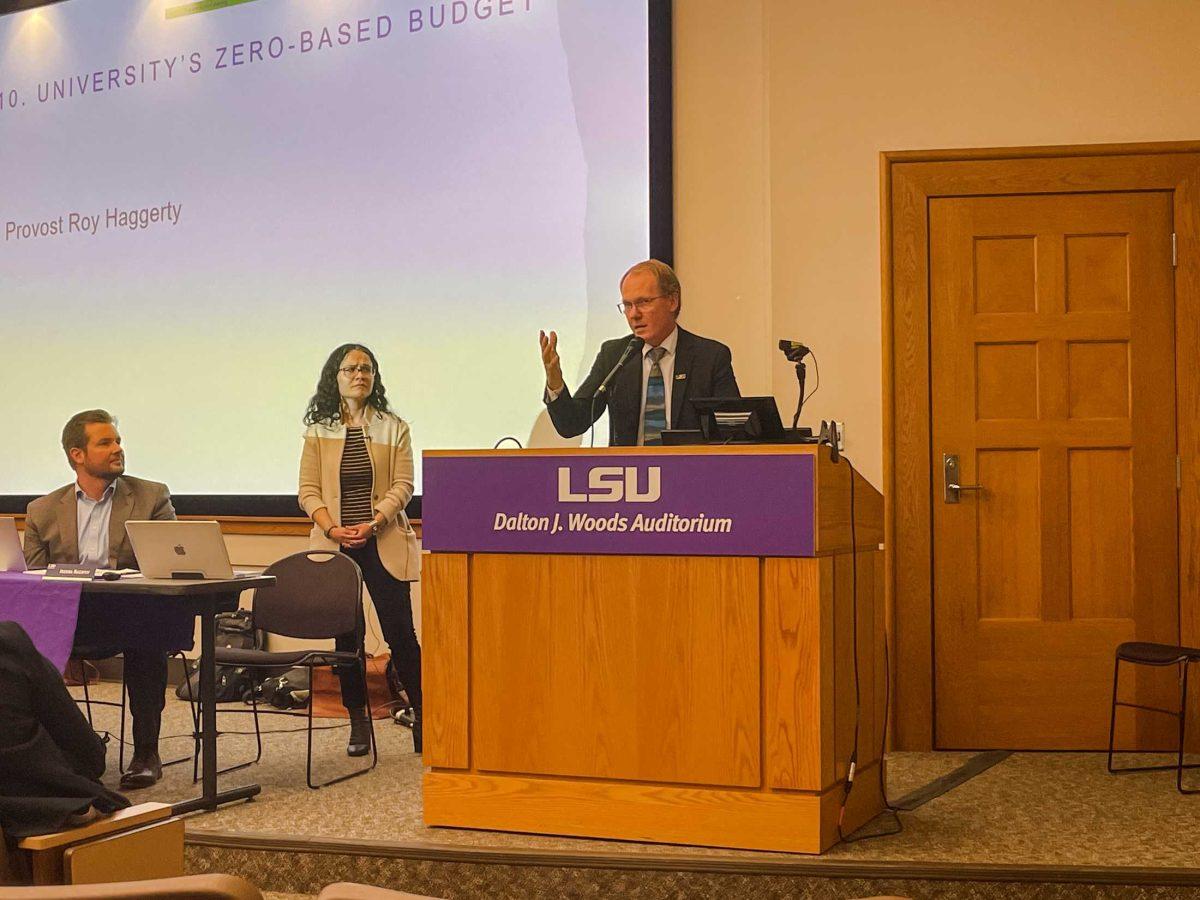LSU Executive Vice President and Provost Roy Haggerty announced a program to provide raises for faculty and benefits for graduate students, to the Faculty Senate at their meeting on Thursday.
Haggerty explained his plans in an eight-minute speech, followed by 40 minutes of questions from faculty senators.
Haggerty said he wants to raise faculty wages every year, something the university has not been doing regularly. He also wants to improve the financial state of graduate students through stipends and providing health benefits.
“We need to make sure we increase our graduate stipends to a level that is nationally competitive and where students are not having to eat from the food bank or wait to have wisdom teeth pulled until they can save up enough money,” Haggerty said. “So, we need to provide stipends that are livable [with] basic health benefits.”
Beginning on July 1, 2023, the university will move toward a zero-based budget “for a small number of years,” Haggerty said. After that, the university may move toward something that takes less effort, he said.
He defined the zero-based budget framework as one in which units of an organization, in this case individual colleges, propose a budget to the administration of an organization, the university, and have justified every single line in that budget; this excludes tenured staff.
After that, Haggerty said college deans will need to propose their budget for the 2024 fiscal year, which is due Jan. 20, 2023.
In terms of graduate stipends, Haggerty said the university created a team consisting of a council of faculty graduate students, vice provost and dean of LSU Graduate School James Spencer, a representative from human resources and a representative from the budget office to provide an implementation plan to bring the graduate stipend to a minimum of $23,000 on a nine-month basis, along with a basic healthcare benefit package. The team has met twice so far, he said.
The team will deliver this plan to Haggerty in three stages, the first stage set to be delivered around Dec. 1. The second stage of information will be delivered Feb. 1, which will include information sufficient enough for the office to write offer letters for graduate stipends. The complete implementation will go into effect on July 1, Haggerty said.
“We should not be paying graduate students a stipend that they cannot afford to live on in Baton Rouge, Louisiana,” Haggerty said. “I’m sure we can all agree on that. We have to increase this, okay? Morally, we have to do this, and practically as well, because [currently] we’re not competitive.”
Haggerty said he will ask the state legislature for additional funding for the plan, but the university shouldn’t rely on that. The university must move forward, Haggerty said, and increasing the stipend is the way to do that.
Senator Robert Cook, a professor representing the science department, said he agrees it needs to be done, but that a lot of guidance on technicalities is needed in these early stages.
Senator Sarah Rosser, an instructor representing the English Department, is also in support, but expressed concerns about the plan’s small salary difference between graduate students and instructors. She said it is a “morale killer” for instructors struggling to get by as professionals.
“We’re looking at a $10,000 difference between a graduate student and a full-time instructor,” Rosser said. “That’s discouraging. We are the dark horses as composition instructors, and we are thrilled to see the university growing with all of the incoming freshmen, but is that disparity in your mind at this point?”
Haggerty responded, adding that there needs to be faculty raises across the board, including instructors. He agreed that instructors need to be paid a fair wage, and said he hopes the implementation of the plan isn’t demoralizing.
Senator Mostafa Elseifi, a professor representing the Civil Engineering Department, was concerned that “the state support in Louisiana is not there.” He said that during his time at Virginia Tech, he found they didn’t have the same problem. In response, Haggerty cited his experience increasing stipends at Oregon State University as the dean of the College of Science as an example showing that it can be done.
Haggerty said the university “can’t continue abusing graduate students this way.”
“It’s like gravity. We don’t like gravity all the time, but we have to obey the law of gravity. We can’t pay our graduate students 10, 12, 13, 15 thousand a year and not give them health benefits,” he said. “I don’t have an answer for every particular grant or other kind of question, but it’ll have to fit in the budget we have.”





